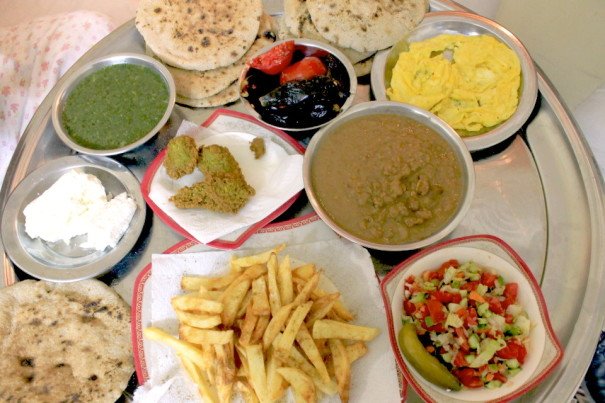
Eating in the Unseemly Hours Before Dawn

Eating in the Unseemly Hours Before Dawn
Iftar in Cairo
Thirty minutes before breakfast and I was stepping out of the metro in Helwan, Cairo. As a foreign woman who was not fasting, my perception of time differed greatly from those who fast for 16.5 hours a day during the Islamic holy month of Ramadan. I was late and we still had a microbus ride to go. One look at Samar was enough for deep remorse to wash over me; while the imam called for iftar (breakfast) at 7 pm and her family sat in front of a feast worthy of a pasha, we might be stuck inside a decrepit microbus.
At 6:45 pm, the driver stopped at a kiosk as I shot Samar a look of utter panic. The driver rushed back to the microbus, equipped with a bottle of soda for the first sip when the maghreb (sunset) prayer marked the breaking of the fast. “Ramadan kareem,” blessed Ramadan, he uttered under his breath and instructed the copilot to pour half the bottle into an empty one to be shared with the rest of us. At 6.50 pm, the microbus halted abruptly for the traffic ahead and a man in the streets approached the rusty old ruin, extended his hands through the window and dropped a handful of dates. We sped off.
At 7 pm, Abdelazim was the first to snatch the Lola (clay pot) and chug a liter of water the minute the speakers at the nearby mosque began to blare. Others preferred to sip hibiscus tea, orange juice, or dates with milk to prepare the stomach for the gargantuan meal ahead. We sat in silence as the household’s matron commanded our way through stuffed ducks, molokheya (jute leaf soup), okra, rokak (minced meat pastry), salad, and pickled vegetables. In the backdrop, the marathon of Egyptian shows broadcasted 24/7 during the holy month, showed a TV presenter playing hidden camera jokes on different Egyptian celebrities.
Once everyone appeased their thirst and hunger, tea was brought to the table. People lounged and drank water, tea, and juice intermittently with great caution. Those blessed with an industrious digestive system continued chatting away in front of the TV, but Samar and I were not that lucky. My friend’s nausea matched by bloated stomach, and much against her will, she took a nap until sahoor, the pre-fast meal just before dawn. The smell of French fries and falafel woke me up minutes before Hadir began calling us back to the living room where food, family, and Ramadan soap operas awaited. Indigestion, exhaustion, and dehydration had left Samar in a comatose state; however, she rose from her slumber for her last chance to taste food and water until the sunset.
An assortment of eggs, cheese, falafel, foul (fava beans), bread, and different kinds of dips laid on a smaller table. While Samar nibbled through the food, I prepared my falafel sandwich accompanied by French fries at the unseemly hour before dawn. I knew I would regret it later, but unlike my hosts, I was not fasting, so who was I to complain?